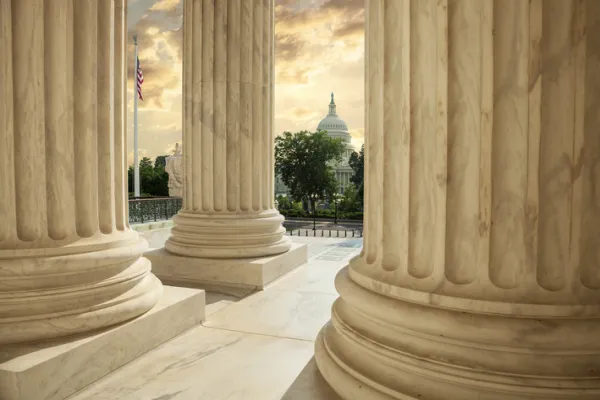Democrats are serious about financial regulatory reform and believe it will help — not hurt — the financial services industry, says Austan Goolsbee, senior economic adviser to Democratic presidential candidate Barack Obama.
“The biggest threat to our financial institutions right now is the uncertainty over who you can trust,” Goolsbee tells Institutional Investor. Increased regulation “is not bad for the financial industry — it’s good. The lack of oversight allowed a small group of people to threaten some of the foundations of the financial system.”
Obama’s six-point reform plan includes increased oversight of investment banks, more-stringent capital and liquidity requirements, a new special commission to identify risks to the entire financial system, a streamlined regulatory structure and tighter controls to prevent market manipulation. “Almost everyone you talk to on Wall Street recognizes the ways that some things have gotten totally out of hand,” says Goolsbee, Robert P. Guinn Professor of Economics at the University of Chicago’s Graduate School of Business, who piloted Obama through economic issues in the primaries and continues as a key adviser in the campaign leading up to the November 4 election.
Obama’s plan so far is long on promises and short on specifics, yet it goes deeper than Republican candidate John McCain’s response to the current credit crisis, which focuses on the roles of Fannie Mae and Freddie Mac and stresses reform of accounting standards and mortgage originators rather than a full-blown regulatory overhaul.
Obama’s biggest change would be to ramp up regulation of investment banks, especially now that the Fed has opened up access to the discount window, says Goolsbee. “Introducing access to the discount window implies oversight at all times.” Obama has not decided who should oversee investment banks — the U.S. Federal Reserve, an existing agency or a new entity — but the near demise of Bear, Stearns & Co. made it clear that today’s supervision by the U.S. Securities and Exchange Commission is not sufficient, Goolsbee says. “Current regulation of investment banks has not been focused on true systemic risk, and that’s where it needs to be if they are going to have a lender of last resort.”
To fight market manipulation, Goolsbee says, Obama wants to create an independent commission that would identify risks to the entire financial system and report to the President’s Working Group on Financial Markets, which brings together key financial market regulators.
Although his reform plans remain loose, Obama has been more specific on the subject of taxes — and some Wall Street insiders are less than impressed. Ronald Sloan, a San Francisco–based portfolio manager at Invesco, which has $482.6 billion in assets worldwide, mostly for institutional and high-net-worth investors, is particularly concerned about Obama’s plan to increase the capital gains tax from 15 percent to 20 percent for those earning more than $250,000 annually. Any hike could encourage investors to sell assets and move into cash — at a time when stock prices are already depressed. “Everyone will wait until they see the whites of their eyes,” Sloan tells II. “People are selling not for tax avoidance, but just trying to get out of the way of a bear market, and whatever taxes are layered on a year from now could change that.” He says investors may simply sell stocks and bonds while capital gains taxes are still relatively low and move more of their assets into cash, which will put further downward pressure on asset values across the board.
In his acceptance speech at the Democratic convention last month, Obama also said he would eliminate capital gains taxes for small businesses and start-ups to promote job creation. Individuals earning less than $250,000 a year will see no change in their capital gains tax rate. Obama also said he would increase taxes on dividends from the current 15 percent to 20 percent for those making over $250,000, and would raise the income tax level for the top two tax brackets to 36 and 39.6 percent, from 33 and 35 percent, respectively.
Although tax policy changes could be swift, the new administration should not rush into any ad hoc regulatory reform, warns Arthur Levitt, a former SEC chairman. “Determine first and determine quickly what went wrong before you give these very same people broader responsibility,” says Levitt, who headed up the SEC during president Bill Clinton’s two terms in office and is a senior adviser for the Carlyle Group.
The current U.S. Treasury’s blueprint for reform calls for vastly expanding the Fed’s responsibility for overall financial stability and giving it direct oversight of streamlined agencies for prudential supervision, covering such areas as capital ratios that guarantee the soundness of an institution, and business conduct supervision, which includes watchdogs such as the SEC and the Commodity Futures Exchange Commission. But Levitt argues that the Fed and other banking regulators have not proved they are up to the task.
To Goolsbee’s credit, perhaps, Obama’s economic strategy has earned him the endorsement of three former SEC chiefs — Levitt, fellow Democrat David Ruder, and Republican William Donaldson. After the primaries, Obama named former Clinton economic adviser Jason Furman to coordinate his economic policy positions, but Goolsbee remains the point man on such key issues as financial regulation. The lanky, self-assured economist, who holds a master’s degree in economics from Yale and a doctorate from the Massachusetts Institute of Technology, says regulatory reform is one of Obama’s key priorities — and a necessity. “The whole system has gotten creaky. It needs fixing.”





